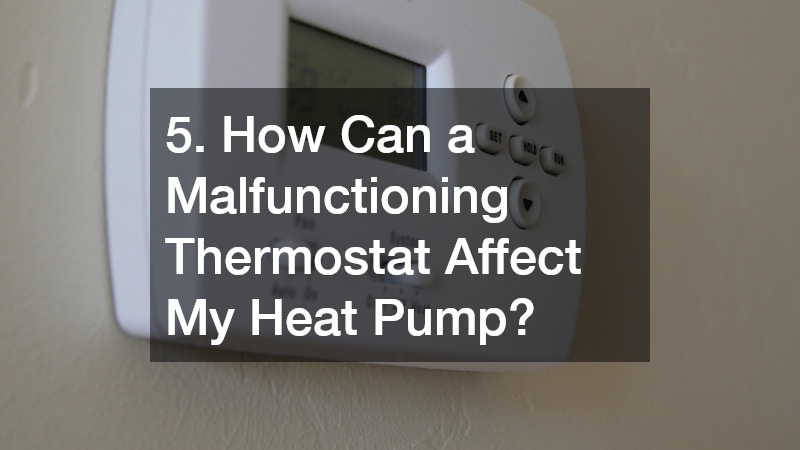Regular maintenance and timely repairs are vital for the efficient operation and longevity of your heat pump. As an essential home appliance that provides both heating and cooling, a heat pump can face multiple issues that necessitate professional intervention.
Neglecting routine inspections could lead to unnecessary breakdowns and increased energy bills. Ensuring optimal performance and avoiding costly replacements means addressing problems as soon as they arise.
This article explores common heat pump issues that homeowners face and explains why calling a professional heat pump service is often the best course of action.
1. Why is My Heat Pump Not Heating Efficiently?
1.1 Common Causes for Inefficient Heating
Inefficient heating can often be traced back to simple issues such as incorrect thermostat settings or obstructed airflow. Sometimes, the filter might be clogged, reducing the system’s efficiency.
Other causes might include low refrigerant levels, which hinder the heat pump’s ability to transfer heat effectively. Leaks or blockages in the ductwork could also contribute to reduced heating capacity.
Understanding these common issues can help homeowners discern when they need professional repair services. Knowledge of how these components work is essential for effective troubleshooting.
1.2 When to Seek Professional Repair Services
It’s crucial to recognize the signs that indicate a need for professional repair, such as prolonged periods of inefficiency or unusual system behavior. Skilled technicians have the tools and knowledge to quickly diagnose and fix complications.
Trying to repair complex issues without expertise might exacerbate the problem and lead to higher repair costs. A technician’s experience ensures that hidden problems are identified and addressed effectively.
Ensuring timely interventions can prevent minor issues from escalating into major complications, saving time and money in the long run. Prioritizing professional repairs complements routine maintenance efforts.
2. How Do I Diagnose Unusual Noises from My Heat Pump?
2.1 Identifying the Source of Unusual Sounds
Noises from a heat pump, like banging, clicking, or hissing, often signal underlying problems. Each noise type can be indicative of different issues, varying from loose components to refrigerant leaks.
Banging sounds may suggest that a part is detached or worn out, while a continuous hissing sound could point to refrigerant escaping through a leak. By identifying the sound, homeowners can better understand the severity of the issue.
Monitoring sounds and their frequency can help determine whether a professional assessment is necessary. Prompt action can prevent further damage and ensure safe operation.
2.2 Role of Professional Diagnosis
A professional diagnosis is invaluable in accurately determining the cause of unusual noises. Experts can use advanced tools and techniques to locate issues that might elude the untrained eye.
By systematically inspecting the system, technicians can correct problems and optimize performance. Approaching repairs methodically ensures that all concerns are addressed thoroughly.
Utilizing professional services not only offers peace of mind but also extends the lifespan of the heat pump by maintaining its optimal condition. Expert involvement is essential for complex evaluations.
3. What to Do if My Heat Pump is Leaking?
3.1 Possible Causes of Leaks
Heat pump leaks can arise from several sources, including blocked drainage systems or damaged refrigerant lines. Water pooling around the unit might indicate drainage problems, while refrigerant leaks can compromise performance.
Leaks can lead to inefficiencies and may increase the risk of environmental hazards due to substances like refrigerants escaping into the air. Early detection is crucial for mitigating any negative impacts.
Understanding leak origins helps predict potential system failures and facilitates timely repair action. Prompt resolution of leaks reduces associated risks.
3.2 Steps a Technician Will Take to Fix Leaks
A technician typically starts by assessing the source of the leak, using specialized equipment to locate the problem accurately. After identification, necessary repairs to affected components—such as sealing or replacing parts—are carried out.
In cases of refrigerant leaks, professionals will also handle the safe disposal and replacement of these substances. By following regulations, they ensure environmental standards are maintained.
Completing repairs with precision guarantees the system returns to its efficient state, minimizing further leaks or energy wastage. Professional oversight ensures compliance and safety.
4. Why Does My Heat Pump Keep Turning On and Off?
4.1 Understanding Short Cycling and Its Causes
Short cycling is a frequent problem where the heat pump frequently turns on and off, often due to incorrect thermostat settings or a malfunctioning component. It can lead to excessive energy use and undue stress on the system.
Recognizing the symptoms of short cycling, such as the unit struggling to maintain the desired temperature, is essential for addressing the problem effectively. Improper sizing or refrigerant levels can also cause this issue.
4.2 Expert Solutions to Address Short Cycling
Resolving short cycling often requires a comprehensive system evaluation by a professional to address the root of the issue. A technician might recalibrate the thermostat or replace defective parts as needed.
If the system is improperly sized, suggesting modifications or replacements might be necessary for optimal performance. Professionals ensure that solutions are sustainable and cost-effective.
5. How Can a Malfunctioning Thermostat Affect My Heat Pump?
5.1 Identifying Thermostat Problems
A failing thermostat can lead to erratic heating or cooling, noticeable by fluctuating indoor temperatures or the unit not responding to settings. Calibration issues or dead batteries are simple causes of thermostat dysfunction.
Advanced systems may show error codes or unresponsiveness when linked to thermostat failures. Immediate attention to these signs prevents broader issues in the heat pump.
5.2 Importance of Professional Thermostat Repair
Relying on professionals for thermostat repair and replacement offers benefits such as accuracy in diagnosis and lasting repair interventions. Technicians ensure programming and connectivity align with system needs.
Improper repairs or replacements can lead to design complications, reducing system efficiency, or causing further damage. Professional repairs prevent such mishaps.

